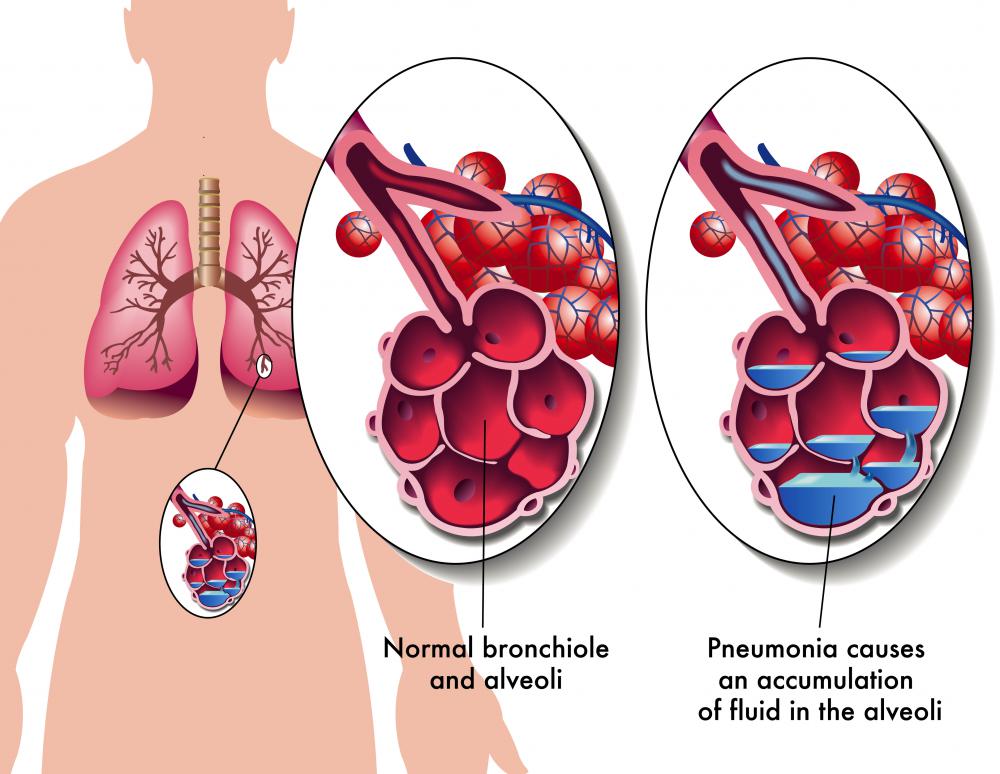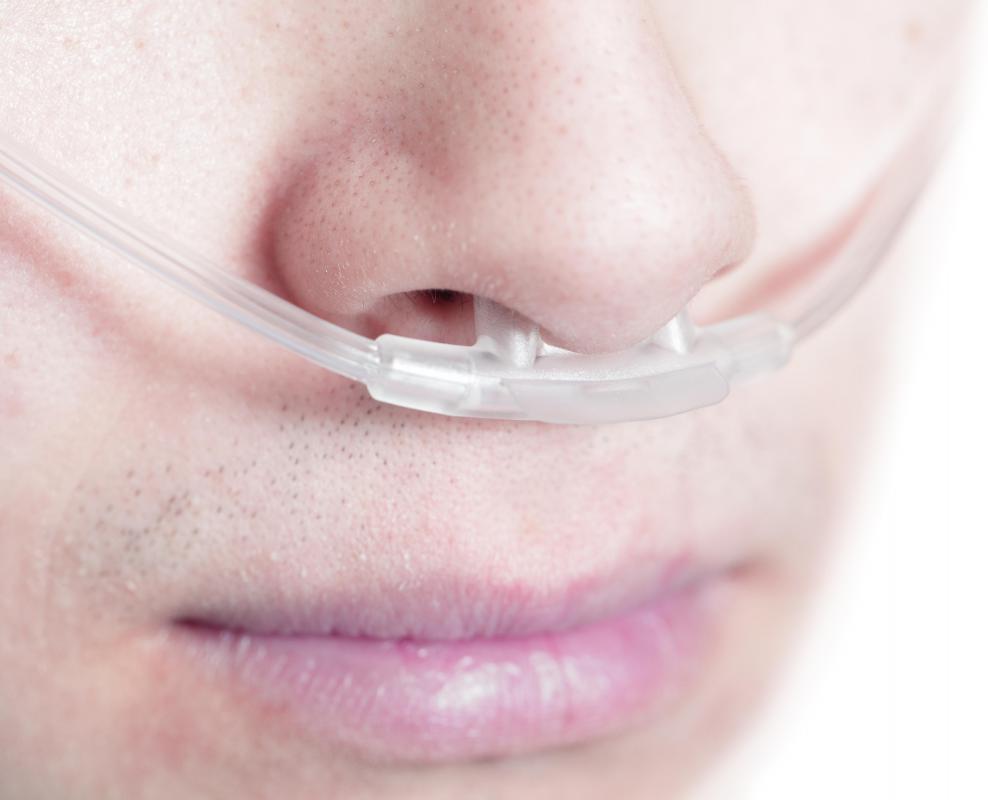At TheHealthBoard, we're committed to delivering accurate, trustworthy information. Our expert-authored content is rigorously fact-checked and sourced from credible authorities. Discover how we uphold the highest standards in providing you with reliable knowledge.
What is Clinical Pneumonia?
Clinical pneumonia is a way to classify pneumonia based on both how long a person has had pneumonia and how he or she contracted the disease. As there are many biological and non-biological causes of pneumonia, this classification system is essential so a patient can begin treatment as soon as possible. After designating a pneumonia as acute or chronic, a doctor determines whether it is community-acquired or hospital-acquired. As a pneumonia's cause can fall outside out of these choices, the problem of misdiagnoses is growing.
The issue with diagnosing pneumonia is that the condition itself, inflammation of lung tissue and the lungs filling with fluid, can be caused by parasites, fungi, bacteria or environmental conditions such as dust. As pneumonia can quickly become life threatening, it is necessary for doctors to systematically approach diagnosing the root cause. Examining the clinical characteristics, how and when the pneumonia presents, allows a doctor to diagnose clinical pneumonia. For example, if the clinical diagnosis reveals that a patient's pneumonia is most likely caused by a bacterium, the patient is given broad spectrum antibiotics. If the antibiotics are ineffective, a doctor must rework his or her clinical diagnosis.

The first step a doctor makes in diagnosing clinical pneumonia is determining whether the pneumonia is acute or chronic. A patient with acute pneumonia developed the condition within three weeks before visiting his or her doctor. Chronic pneumonia is a condition that has lasted a longer period of time. The distinction is important, because if a doctor can determine whether a pneumonia is acute or chronic, he or she can significantly narrow the list of possible causes. Before treatment can begin, it is still necessary to know where the patient acquired pneumonia.

Community-acquired and hospital-acquired clinical pneumonia are the two choices a doctor considers before treating his or her patient. Community-acquired narrows the list of causes to certain sets of bacteria and viruses. It is the most common type. Hospital-acquired is only considered if the patient was recently in the hospital or if the pneumonia developed during a hospital stay. A group of bacteria including MRSA causes hospital-acquired clinical pneumonia.

Though clinically diagnosing pneumonia generally allows treatment to begin earlier and saves more lives, misdiagnosis of clinical pneumonia caused by a chemical or non-biological factor is a real possibility. Heavy dust and some aerosol chemicals create the same set of symptoms as viral or bacterial pneumonia. A patient may receive the wrong treatment while his or her condition worsens. Also, the rise of new pneumonia-causing viruses such as SARS are making doctors reconsider the overall effectiveness of the clinical diagnosis.
AS FEATURED ON:
AS FEATURED ON:



















Discussion Comments
@Grivusangel-- Yea, upper respiratory infections can turn into pneumonia but usually don't as long as they are treated right away. Ignoring the problem or not taking medications speeds things up.
I think if someone is diagnosed with clinical chronic community acquired pneumonia, they've clearly not done enough in terms of treatment.
@Lostnfoun-- I got the pneumonia vaccine but my doctor said that it's for people over 65. So I think you'll have to wait longer. Children under two and elderly over 65 are at greater risk for pneumonia. So you don't really need it until you're 65 anyway.
The good thing is that it's only one vaccine and protects for the remainder of our lives. It's actually a vaccine for streptococcus pneumoniae bacteria which can also cause meningitis. So the same vaccine protects from meningitis as well. The pneumonia vaccine for children for example is more than one shot.
My grandmother picked up clinical pneumonia when she was in the hospital for something else. She had to extend her stay so that they could treat her for the pneumonia as well. It was worrisome but thankfully she recovered.
This is why I hate to stay in the hospital. I had to have a minor surgery recently and I went home as soon as I could. My doctor gave me the option to stay longer at the hospital but I didn't want to.
Although hospitals do their best to maintain hygiene, they can become a hub for bacteria and viruses despite all efforts. Many people pick up things when they stay after surgeries. And bacteria causing pneumonia is probably one of the worst things to pick.
I've been seeing ads for the pneumonia shot. Has anyone taken it? Can anyone tell me how effective it really is? I talked to my doctor about it and she said she recommended it for patients over 55. I'm not that age yet, but I wondered if I need to take it anyway?
I've also wondered about the shingles vaccine. I've had chicken pox, and I've heard the worse your case of chicken pox was, the lower the chance you'll get shingles. Not sure I believe that, but I did have a horrific case of chicken pox. The only time I've been sicker, I think, is when I had the flu when I was 17 and missed a week of school.
I really don't want to get pneumonia, and if I can avoid it by taking the vaccine, I'll take it.
So, as I understand it, clinical pneumonia is the general diagnosis. The patient has pneumonia. Narrowing down the type and cause of the pneumonia is the next step. Well, I suppose that makes some kind of sense.
I've had bronchitis, but never pneumonia. I was treated in time. My ENT doctor said untreated, bronchitis can turn into pneumonia. My bronchitis was always bacterial in nature, so antibiotics worked for me, thankfully. It's never fun when the meds don't work like they're supposed to, or are working on the wrong thing.
My sister had walking pneumonia several years ago and she was on antibiotics for about three weeks. It was stubborn, and she was pretty sick.
Post your comments